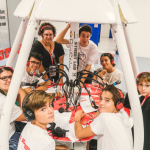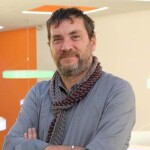ABSTRACTS
1ST SESSION
EDUCATION DURING COVID-19 AND BEYOND

How a “traveling school” has redesigned its curriculum in the pandemic
Jamie Steckart
 As former Headmaster for Think Global School will look back on how this world-traveling upper secondary school, handled its transition into the Covid-19 era, when the school was no longer able to travel. Before Covid-19 students at the school used to immerse themselves in 4 different countries each year, visiting twelve before they graduate.
As former Headmaster for Think Global School will look back on how this world-traveling upper secondary school, handled its transition into the Covid-19 era, when the school was no longer able to travel. Before Covid-19 students at the school used to immerse themselves in 4 different countries each year, visiting twelve before they graduate.
I will give key insights on how the school used previous online learning techniques to handle disruptions in their education. What lessons can other schools learn from their experience moving forward as they implement and prepare for these types of contingencies?
Students: living and studying in times of COVID-19
Some students from Radioimmaginaria, the teenagers network
 Radioimmaginaria is a network operated by teens aged 11 to 17.
Radioimmaginaria is a network operated by teens aged 11 to 17.
More than 200 girls and boys from different European countries are part of it.
Our aim is to share our aspirations, our lives and studies.
During lockdown Radioimmaginaria has not stopped broadcasting.
Indeed, lockdown restrictions have strengthened our desire to stay connected to our peers all over the world and talk about the “hidden lives” we are living between remote lessons, stress and dreams.
The Power of Gathering – the Elements of Transformation
Nathan Strenge
 If you’ve ever thought why do we keep doing that to our kids, this session is for you. At Fielding International, we work with schools and communities around the world who have transformed their learning ecosystem by aligning their vision, environment, and human capacity. We’re sharing the source code for how to apply our best practices and design patterns that will help align your own learning ecosystem. Upon leaving this session, you will have an understanding of what we have learned from designing schools in over 50 countries on 6 continents, and what the first steps are to begin your own locally sourced alignment journey.
If you’ve ever thought why do we keep doing that to our kids, this session is for you. At Fielding International, we work with schools and communities around the world who have transformed their learning ecosystem by aligning their vision, environment, and human capacity. We’re sharing the source code for how to apply our best practices and design patterns that will help align your own learning ecosystem. Upon leaving this session, you will have an understanding of what we have learned from designing schools in over 50 countries on 6 continents, and what the first steps are to begin your own locally sourced alignment journey.
Education in the age of artificial intelligence: critical issues, limits and new frontiers of technology
Cristina Pozzi
 The pandemic has accelerated the digitalization in schools by force opening their doors to platforms, devices and new learning methods .
The pandemic has accelerated the digitalization in schools by force opening their doors to platforms, devices and new learning methods .
This has made the topic of artificial intelligence technologies applied to education even more relevant. Which are the most promising applications?
What impact do they have on the learning process? But above all, which ethical principles should we follow in opening up to these new worlds?
These are the questions and challenges I will deal with in my presentation.
Learner-centered education in the era of remote instruction
Ben Kornell
 Work in progress…
Work in progress…
.
.
.
.
.
.
2ND SESSION:
COVID-19: EDUCATION CHALLENGES AND RESPONSES

It’s time for education to prepare for the new normal
Claire Amos
 In my presentation I will share my experiences of teaching and leading within the New Zealand (NZ) education system. New Zealand is known for its self-governing schools, its innovative and creative national curriculum which encourages schools and educators to personalize learning to their local context and student interests.
In my presentation I will share my experiences of teaching and leading within the New Zealand (NZ) education system. New Zealand is known for its self-governing schools, its innovative and creative national curriculum which encourages schools and educators to personalize learning to their local context and student interests.
Whilst last year saw the world massive disruption, we also experienced “a once in a pandemic” chance to prepare for a “new normal” in all areas of how we love, live and work. As a secondary school leader, I focused on how Albany Senior High School (ASHS) might reimagine secondary schooling, so as to ensure a hope of rolling with the punches and coming out of this fight fit for the 21st Century challenges.
Throughout 2020 ASHS worked with their students, community and teachers to co-design a flexible and agile approach to learning that saw students continue to thrive both within school and online developing learner agency and designing learning that enables students to work in an increasingly self-directed manner. The school also took the opportunity to prioritise student and staff wellbeing with a focus on developing deep learning relationships between teachers and learners. ASHS also seized the opportunity to become increasingly responsive and creative in how they evidenced student learning, with an already flexible National Certificate of Educational Achievement (NCEA) the school focused on developing individualised assessment plans and assessing students when they were ready, gathering portfolios of evidence so as to maximize opportunities to curate and collect evidence of learning over time both online and face to face.
February 2021 sees the beginning of a new school year in New Zealand and whilst not currently in lockdown I and my school see the new year as an opportunity to embed and amplify what we now regard as a new normal.
Education rediscovered: what have we learned from Covid-19?
Daniele Barca
 The story I will tell has been going on at IC 3 in Modena, Italy, since March 2020, and it could be summarized with the slogan “Today we could”. In some way the changes and adaptability imposed by the coronavirus have given a boost to the virtuous circle guidlines / competences / curriculum / activities / assessment. Throughout our primary and junior school, but especially in the junior school Pier Santi Mattarella, the process of experimentation has taken the name of “Beyond the subjects”, with personalized tutoring, clubs, subjects without subjects. The idea is to develop transdisciplinary teaching and learning, trying to avoid splintering knowledge into subjects, and to adopt self-assessment and formative assessment without marks during the school year, and with a final certification of competences.
The story I will tell has been going on at IC 3 in Modena, Italy, since March 2020, and it could be summarized with the slogan “Today we could”. In some way the changes and adaptability imposed by the coronavirus have given a boost to the virtuous circle guidlines / competences / curriculum / activities / assessment. Throughout our primary and junior school, but especially in the junior school Pier Santi Mattarella, the process of experimentation has taken the name of “Beyond the subjects”, with personalized tutoring, clubs, subjects without subjects. The idea is to develop transdisciplinary teaching and learning, trying to avoid splintering knowledge into subjects, and to adopt self-assessment and formative assessment without marks during the school year, and with a final certification of competences.
Students: one link, one click, one world
Lene Jesby Lange
 Work in progress…
Work in progress…
.
.
.
.
.
.
Reimagining education to identify creative potential
Amna Habiba
 Being a girl, and living in a 3rd-world country I never knew of the vast sea of knowledge and fields that was out there. COVID provided me with the opportunity to redefine the meaning of education and discover my hidden talent. Now I am on a mission to help change the education system in Pakistan, make skill-training a norm especially for girls so that we can identify creative potential among youth. I’ll talk about my journey and how I am reimagining the future, passionately working at the intersection of tech, science, and education, as a #education activist of YxY and the founder of Global Creative Hub, an educational platform promoting 21st-century skills through capacity building program.
Being a girl, and living in a 3rd-world country I never knew of the vast sea of knowledge and fields that was out there. COVID provided me with the opportunity to redefine the meaning of education and discover my hidden talent. Now I am on a mission to help change the education system in Pakistan, make skill-training a norm especially for girls so that we can identify creative potential among youth. I’ll talk about my journey and how I am reimagining the future, passionately working at the intersection of tech, science, and education, as a #education activist of YxY and the founder of Global Creative Hub, an educational platform promoting 21st-century skills through capacity building program.
Finding power from collaboration – through COVID and beyond
Lasse Leponiemi
 No organisation has been unaffected by the COVID-19 pandemic. The education sector around the world was forced to react quickly by closing schools and shifting to distance learning. Many countries have been creating new regulations for schools to cope with the situation caused by the pandemic. Distance and hybrid learning is the new norm, and some countries – including Finland – have even made legislative changes to provide more freedom to schools and offer learning experiences in the safest way possible. These changes have included a right to organise learning in a flexible manner, balancing between in-school and distance education.
No organisation has been unaffected by the COVID-19 pandemic. The education sector around the world was forced to react quickly by closing schools and shifting to distance learning. Many countries have been creating new regulations for schools to cope with the situation caused by the pandemic. Distance and hybrid learning is the new norm, and some countries – including Finland – have even made legislative changes to provide more freedom to schools and offer learning experiences in the safest way possible. These changes have included a right to organise learning in a flexible manner, balancing between in-school and distance education.
Some of the practices learned during this time will remain and transform the learning experience for students in the future. At the same time, at-risk students have struggled with their education world-wide. For many of these children, the change of educational landscape has caused extra stress, frustration, and difficulties. How education systems can take care of these students? And while we are doing so, it’s important to not only look at the student wellbeing but also parent and teacher wellbeing – how these demands and needs can be met?
HundrED has been doing their best to find solutions for students, education providers, educators and guardians in this challenging situation. In April and May 2020, HundrED quickly re-prioritized their work and set up a task force to look into different solutions that help educators around the world handle the change. HundrED Covid Toolkit was then published in May 2020 in collaboration with the OECD. In this presentation I will be sharing our findings of the initial research and what has happened with solutions since then.



